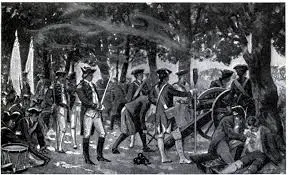War of Plasi:
It seems there might be a slight confusion in the term you provided. If you are referring to the "Battle of Plassey," I can provide you with information about that historical event.
Battle of Plassey (1757):
The Battle of Plassey was a significant battle that took place on June 23, 1757, near the village of Plassey in Bengal, India, during the period of British colonial rule. The battle was a crucial turning point in the history of British India and played a key role in the establishment of British control over Bengal.
Background:
Conflict: The battle was fought between the British East India Company, led by Robert Clive, and the Nawab of Bengal, Siraj-ud-Daulah.
Causes: The conflict arose due to economic and political tensions. The British East India Company sought to expand its influence and trade in Bengal, while the Nawab was suspicious of their growing power and influence.
 |
| War of Plasi |
Events of the Battle:
British Forces: The British East India Company, supported by Indian allies and local political factions opposed to the Nawab, faced the Nawab's army, which was numerically superior.
Treachery: Mir Jafar, a senior commander in the Nawab's army, betrayed Siraj-ud-Daulah and switched sides during the battle, which significantly weakened the Nawab's forces.
Outcome: The British emerged victorious due to the betrayal of Mir Jafar. The Battle of Plassey resulted in the defeat and subsequent overthrow of Siraj-ud-Daulah, allowing the British East India Company to gain control over Bengal.
Impact:
Establishment of British Control: The victory at Plassey enabled the British East India Company to establish control over Bengal, paving the way for further expansion of British rule in India.
Economic Exploitation: British control over Bengal led to economic exploitation, including the imposition of heavy taxes and the drain of wealth from India to Britain.
Political Consequences: The battle weakened indigenous rulers and contributed to the consolidation of British power in India. It marked the beginning of the Company's political influence over large parts of the subcontinent.
The Battle of Plassey is regarded as a crucial event in Indian history, as it laid the foundation for British colonial dominance in India, which lasted for nearly two centuries until India gained independence in 1947.